If there is something worse for investors than a debt crisis, it’s a debt crisis with constitutional turmoil on the side.
Such is the case in Venezuela.
Over the past several months, Venezuela has missed deadlines on bond payments, putting investors on edge. The only response from the government of President Nicolás Maduro so far has been an ambiguous proposal of renegotiation that has not yet been implemented. Lawsuits loom.
At the same time, and particularly since the Maduro-backed National Constituent Assembly superseded the authority of the democratically elected National Assembly, Venezuela’s constitutional democracy has continued to erode. This has led to international sanctions that restrict some debt operations, and a call by Maduro for early presidential elections that are sure to shake out in the government’s favor.
Two topics need to be addressed in order to gauge the potential effects of this democratic crisis on Venezuela’s future debt negotiations. First are concerns related to the constitutionality of Venezuelan debt, especially debts incurred since the installation of the Constituent Assembly. Second is the legal capacity, under Venezuelan law, of Maduro’s government in its current form to enter into a debt restructuring agreements in the first place.
The constitutional question
Most of the Venezuela’s external debt has been contracted since a boom in oil prices that began in 2006. Indeed, according to some estimates, Venezuela’s indebtedness has increased five-fold since that time.
The constitutional framework regarding public debt in Venezuela is simple. Congress – which is by rights the National Assembly – must approve the debt ceiling together with the national budget. In addition, and according to a law that was in force until 2015, each and every debt operation must be approved by the Assembly’s Permanent Finance Commission. PDVSA, the state-run oil company, is exempt from this parliamentary control over its debt. However, any debt contract considered to be in the national interest, including PDVSA contracts, are subject to special parliamentary control.
Until 2015, the National Assembly, under the political control of the ruling PSUV party, did indeed approve the debt ceiling together with the national budget. Consequently, Venezuelan public debt was, at that time, acquired in accordance with the Constitution. (A case-by-case analysis could potentially demonstrate violations of the Constitution’s rationality standard, but in general Venezuelan debt contracted up until 2015 can be presumed valid.)
This situation changed in 2016, when the debt ceiling and the national budget were approved not by the National Assembly – then under control of the opposition – but by the government, due to an emergency decree and a ruling of the Supreme Court. The following year, the debt ceiling and the national budget were approved by Maduro’s National Constituent Assembly, the legislative body he had installed, by most readings, illegally. As a result, any new debt contracted since 2016 could be deemed unconstitutional, in particular debt approved by this new assembly.
Debt can be considered odious – and, by standards of international law, invalid – if it was taken on by illegitimate authorities for an illegitimate purpose so long as the debtor is aware of that illegitimacy.
This could have a major impact on eventual debt renegotiations, especially in the event of a change in government. A new government could use this rationale to cancel some debt incurred after 2016. The case won’t necessarily be clear-cut – foreign law plays a role in governing bond issues – but it is certainly feasible that they will succeed.
Debt restructuring
When at risk of default, or when already in the middle of one, a reasonable strategy of any government is to propose debt restructuring. Nevertheless, this is not a real possibility under the current Venezuelan administration, at least as far as the constitution is concerned.
In general, Venezuelan law holds that public debt restructuring is not subject to congressional oversight. But this principle has three exceptions, in which the approval by the Congress is mandatory: first, if the debt restructuring doesn’t improve the financial position of government; second, if the restructuring includes debt issuance that exceeds the debt ceiling approved by law; and third, if the restructuring agreements are considered to be in the national interest.
But the application of this framework in the current constitutional situation is problematic, because, assuming that National Constituent Assembly is considered illegitimate, there has been no congressional approval of the debt ceiling and the national budget. As a consequence, any debt restructuring will exceed the legal limit of indebtedness (which technically is zero, since there is no law to set that limit). Because of this, any current restructuring would require a special law by the opposition-majority National Assembly. But it is unlikely that the National Assembly would approve such a law. First, because the National Assembly cannot approve any law due to the obstacles adopted by the Supreme Court and the Constituent Assembly; second, because the opposition would only be willing to approve a restructuring as a result of major changes in economic policies – something that is highly unlikely given the current regime.
A perfect storm
Venezuela’s multi-faceted crisis represents a perfect storm for investors. Not only does the economic crisis increase the risks of default, but the constitutional crisis could affect the validity of public debt and prevent any valid restructuring agreements. Until the constitutional turmoil is resolved, investors will have only two options: wait until the storm is over (i.e., until a new government is in place), or seek legal remedies against default and hope that doubts about the constitutionality of the debt prove unwarranted.
—
Hernández G. is a visiting fellow at the Harvard Kennedy School of Government Center for International Development









